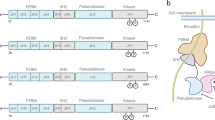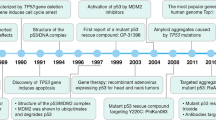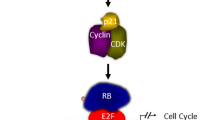Abstract
Anaplastic lymphoma kinase (ALK) was originally identified from a rare subtype of non-Hodgkin's lymphomas carrying t(2;5)(p23;q35) translocation, where ALK was constitutively activated as a result of a fusion with nucleophosmin (NPM). Aberrant ALK fusion proteins were also generated in inflammatory fibrosarcoma and a subset of non-small-cell lung cancers, and these proteins are implicated in their pathogenesis. Recently, ALK has been demonstrated to be constitutively activated by gene mutations and/or amplifications in sporadic as well as familial cases of neuroblastoma. Here we describe another mechanism of aberrant ALK activation observed in a neuroblastoma-derived cell line (NB-1), in which a short-form ALK protein (ALKdel2-3) having a truncated extracellular domain is overexpressed because of amplification of an abnormal ALK gene that lacks exons 2 and 3. ALKdel2-3 was autophosphorylated in NB-1 cells as well as in ALKdel2-3-transduced cells and exhibited enhanced in vitro kinase activity compared with the wild-type kinase. ALKdel2-3-transduced NIH3T3 cells exhibited increased colony-forming capacity in soft agar and tumorigenicity in nude mice. RNAi-mediated ALK knockdown resulted in the growth suppression of ALKdel2-3-expressing cells, arguing for the oncogenic role of this mutant. Our findings provide a novel insight into the mechanism of deregulation of the ALK kinase and its roles in neuroblastoma pathogenesis.
This is a preview of subscription content, access via your institution
Access options
Subscribe to this journal
Receive 50 print issues and online access
$259.00 per year
only $5.18 per issue
Buy this article
- Purchase on Springer Link
- Instant access to full article PDF
Prices may be subject to local taxes which are calculated during checkout






Similar content being viewed by others
References
Morris SW, Kirstein MN, Valentine MB, Dittmer K, Shapiro DN, Look AT et al. Fusion of a kinase gene, ALK, to a nucleolar protein gene, NPM, in non-Hodgkins-lymphoma (Vol 263, PG 1281, 1994). Science 1995; 267: 316–317.
Shiota M, Nakamura S, Ichinohasama R, Abe M, Akagi T, Takeshita M et al. Anaplastic large-cell lymphomas expressing the novel chimeric protein P80(NPM/ALK)—a distinct clinicopathological entity. Blood 1995; 86: 1954–1960.
Griffin CA, Hawkins AL, Dvorak C, Henkle C, Ellingham T, Perlman EJ . Recurrent involvement of 2p23 in inflammatory myofibroblastic tumors. Cancer Res 1999; 59: 2776–2780.
Jazii FR, Najafi Z, Malekzadeh R, Conrads TP, Ziaee AA, Abnet C et al. Identification of squamous cell carcinoma associated proteins by proteomics and loss of beta tropomyosin expression in esophageal cancer. World J Gastroenterol 2006; 12: 7104–7112.
Rikova K, Guo A, Zeng Q, Possemato A, Yu J, Haack H et al. Global survey of phosphotyrosine signaling identifies oncogenic kinases in lung cancer. Cell 2007; 131: 1190–1203.
Soda M, Choi YL, Enomoto M, Takada S, Yamashita Y, Ishikawa S et al. Identification of the transforming EML4-ALK fusion gene in non-small-cell lung cancer. Nature 2007; 448: 561–5U3.
Chen YY, Takita J, Choi YL, Kato M, Ohira M, Sanada M et al. Oncogenic mutations of ALK kinase in neuroblastoma. Nature 2008; 455: 971–U56.
George RE, Sanda T, Hanna M, Frohling S, Luther W, Zhang JM et al. Activating mutations in ALK provide a therapeutic target in neuroblastoma. Nature 2008; 455: 975–978.
Janoueix-Lerosey I, Lequin D, Brugieres L, Ribeiro A, de Pontual L, Combaret V et al. Somatic and germline activating mutations of the ALK kinase receptor in neuroblastoma. Nature 2008; 455: 967–U51.
Mosse YP, Laudenslager M, Longo L, Cole KA, Wood A, Attiyeh EF et al. Identification of ALK as a major familial neuroblastoma predisposition gene. Nature 2008; 455: 930–U22.
Maris JM, Hogarty MD, Bagatell R, Cohn SL . Neuroblastoma. Lancet 2007; 369: 2106–2120.
De Bernardi B, Nicolas B, Boni L, Indolfi P, Carli M, di Montezemolo LC et al. Disseminated neuroblastoma in children older than one year at diagnosis: comparable results with three consecutive high-dose protocols adopted by the Italian Co-Operative Group for Neuroblastoma. J Clin Oncol 2003; 21: 1592–1601.
Matthay KK, Villablanca JG, Seeger RC, Stram DO, Harris RE, Ramsay NK et al. Treatment of high-risk neuroblastoma with intensive chemotherapy, radiotherapy, autologous bone marrow transplantation, and 13-cis-retinoic acid. N Engl J Med 1999; 341: 1165–1173.
Pearson ADJ, Pinkerton CR, Lewis IJ, Imeson J, Ellershaw C, Machin D et al. High-dose rapid and standard induction chemotherapy for patients aged over 1 year with stage 4 neuroblastoma: a randomised trial. Lancet Oncol 2008; 9: 247–256.
Beckmann G, Bork P . An adhesive domain detected in functionally diverse receptors. Trends Biochem Sci 1993; 18: 40–41.
Loren CE, Englund C, Grabbe C, Hallberg B, Hunter T, Palmer RH . A crucial role for the anaplastic lymphoma kinase receptor tyrosine kinase in gut development in Drosophila melanogaster. EMBO Rep 2003; 4: 781–786.
Choudhary C, Olsen JV, Brandts C, Cox J, Reddy PNG, Boehmer FD et al. Mislocalized activation of oncogenic RTKs switches downstream signaling outcomes. Mol Cell 2009; 36: 326–339.
Mazot P, Cazes A, Boutterin MC, Figueiredo A, Raynal V, Combaret V et al. The constitutive activity of the ALK mutated at positions F1174 or R1275 impairs receptor trafficking. Oncogene 2011; 30: 2017–2025.
Lemmon MA, Schlessinger J . Cell signaling by receptor tyrosine kinases. Cell 2010; 141: 1117–1134.
Lu Y, Yao HP, Wang MH . Multiple variants of the RON receptor tyrosine kinase: biochemical properties, tumorigenic activities, and potential drug targets. Cancer Lett 2007; 257: 157–164.
Pedersen MW, Meltorn M, Damstrup L, Poulsen HS . The type III epidermal growth factor receptor mutation—biological significance and potential target for anti-cancer therapy. Ann Oncol 2001; 12: 745–760.
Ekstrand AJ, James CD, Cavenee WK, Seliger B, Pettersson RF, Collins VP . Genes for epidermal growth-factor receptor, transforming growth factor-alpha, and epidermal growth-factor and their expression in human gliomas in vivo. Cancer Res 1991; 51: 2164–2172.
Wong AJ, Ruppert JM, Bigner SH, Grzeschik CH, Humphrey PA, Bigner DS et al. Structural alterations of the epidermal growth-factor receptor gene in human gliomas. Proc Natl Acad Sci USA 1992; 89: 2965–2969.
Gan HK, Kaye AH, Luwor RB . The EGFRvIII variant in glioblastoma multiforme. J Clin Neurosci 2009; 16: 748–754.
Prigent SA, Nagane M, Lin H, Huvar I, Boss GR, Feramisco JR et al. Enhanced tumorigenic behavior of glioblastoma cells expressing a truncated epidermal growth factor receptor is mediated through the Ras-Shc-Grb2 pathway. J Biol Chem 1996; 271: 25639–25645.
Zhou YQ, He C, Chen YQ, Wang D, Wang MH . Altered expression of the RON receptor tyrosine kinase in primary human colorectal adenocarcinomas: generation of different splicing RON variants and their oncogenic potential. Oncogene 2003; 22: 186–197.
Ronsin C, Muscatelli F, Mattei MG, Breathnach R . A novel putative receptor protein tyrosine kinase of the met family. Oncogene 1993; 8: 1195–1202.
Wang MH, Kurtz AL, Chen YQ . Identification of a novel splicing product of the RON receptor tyrosine kinase in human colorectal carcinoma cells. Carcinogenesis 2000; 21: 1507–1512.
Chen YQ, Zhou YQ, Angeloni D, Kurtz AL, Qiang XZ, Wang MH . Overexpression and activation of the RON receptor tyrosine kinase in a panel of human colorectal carcinoma cell lines. Exp Cell Res 2000; 261: 229–238.
Palmer RH, Vernersson E, Grabbe C, Hallberg B . Anaplastic lymphoma kinase: signalling in development and disease. Biochem J 2009; 420: 345–361.
Chiarle R, Voena C, Ambrogio C, Piva R, Inghirami G . The anaplastic lymphoma kinase in the pathogenesis of cancer. Nat Rev Cancer 2008; 8: 11–23.
Schulte JH, Bachmann HS, Brockmeyer B, DePreter K, Oberthur A, Ackermann S et al. High ALK receptor tyrosine kinase expression supersedes ALK mutation as a determining factor of an unfavorable phenotype in primary neuroblastoma. Clin Cancer Res 2011; 17: 5082–5092.
Takita J, Yang HW, Chen YY, Hanada R, Yamamoto K, Teitz T et al. Allelic imbalance on chromosome 2q and alterations of the caspase 8 gene in neuroblastoma. Oncogene 2001; 20: 4424–4432.
Brodeur GM, Pritchard J, Berthold F, Carlsen NLT, Castel V, Castleberry RP et al. Revisions of the international criteria for neuroblastoma diagnosis, staging, and response to treatment. J Clin Oncol 1993; 11: 1466–1477.
Takita J, Hayashi Y, Nakajima T, Adachi J, Tanaka T, Yamaguchi N et al. The p16 (CDKN2A) gene is involved in the growth of neuroblastoma cells and its expression is associated with prognosis of neuroblastoma patients. Oncogene 1998; 17: 3137–3143.
Donella-Deana A, Marin O, Cesaro L, Gunby RH, Ferrarese A, Coluccia AML et al. Unique substrate specificity of anaplastic lymphoma kinase (ALK): development of phosphoacceptor peptides for the assay of ALK activity. Biochemistry 2005; 44: 8533–8542.
Smith JL, McBride CM, Nataraj PS, Bartos DC, January CT, Delisle BP . Trafficking-deficient hERG K(+) channels linked to long QT syndrome are regulated by a microtubule-dependent quality control compartment in the ER. Am J Physiol-Cell Physiol 2011; 301: C75–C85.
Acknowledgements
We thank Mrs Matsumura, Mrs Hoshino, Mrs Yin, Miss Ogino and Mrs Saito for their excellent technical assistance. We would also thank Dr Tanaka, Dr Saito, Mr Shiosaka and Mrs Mori for useful advice concerning biological analysis; Dr AT Look, Harvard Medical University, and Dr A Inoue, St Jude Children's Research Hospital, for their generous gifts of neuroblastoma cell lines. This work was supported by Research on Measures for Intractable Diseases, Health and Labor Sciences Research Grants, Ministry of Health, Labor and Welfare, Research on Health Sciences focusing on Drug Innovation, the Japan Health Sciences Foundation and Core Research for Evolutional Science and Technology, Japan Science and Technology Agency.
Author information
Authors and Affiliations
Corresponding author
Ethics declarations
Competing interests
The authors declare no conflict of interest.
Additional information
Supplementary Information accompanies the paper on the Oncogene website
Supplementary information
Rights and permissions
About this article
Cite this article
Okubo, J., Takita, J., Chen, Y. et al. Aberrant activation of ALK kinase by a novel truncated form ALK protein in neuroblastoma. Oncogene 31, 4667–4676 (2012). https://doi.org/10.1038/onc.2011.616
Received:
Accepted:
Published:
Issue Date:
DOI: https://doi.org/10.1038/onc.2011.616
Keywords
This article is cited by
-
ALK fusions in the pan-cancer setting: another tumor-agnostic target?
npj Precision Oncology (2023)
-
Novel TENM3–ALK fusion is an alternate mechanism for ALK activation in neuroblastoma
Oncogene (2022)
-
Pan-neuroblastoma analysis reveals age- and signature-associated driver alterations
Nature Communications (2020)
-
The ALK receptor in sympathetic neuron development and neuroblastoma
Cell and Tissue Research (2018)
-
High expression of β-catenin contributes to the crizotinib resistant phenotype in the stem-like cell population in neuroblastoma
Scientific Reports (2017)



